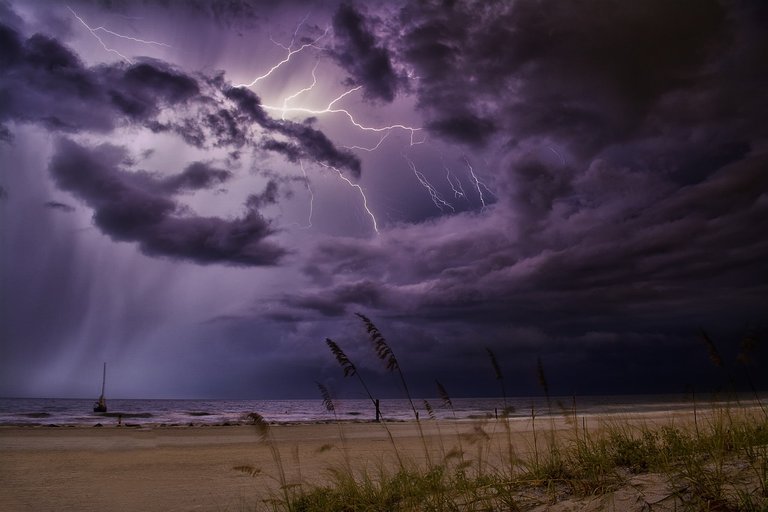
As the title says this contains spoilers for the story When There Were Whales. If you haven't read the story yet, and don't want spoilers, scroll on down to the bottom of the page and you'll find the links to the story chapters.
If you read the corresponding post I did following Tomorrow's Daughter then you'll remember I mentioned two stories where hand-wavium time travel happens. This is the second one. Does the fact that the method of time-travel is the same, outrageous storms with purple lightning, mean the stories happen in the same universe? Sure, why not.
So what to say about When There Were Whales?
Let's start with when it was originally written, and why I've posted it now. The origins of this story are back in 2016 when there was a women candidate for president of the US. The original story wasn't set in 2016, but rather 2032, and the world is already subtly different. The 22nd amendment has been overturned, and the woman president at the story beginning is running for her third term, and expected to win because the other party has rolled out another unfavorable candidate.
In the version of the story published over this week the dates have been pushed out to 2052, but the background resonance of a woman candidate for US president made now feel the time to pull the story out of the trunk (as with Tomorrow's Daughter I never found an editor who liked the story enough to publish it - though one came close but felt a third story from me would make the anthology a bit unweighted).
Moving on to why I chose whales as the main thing in the story, I can point directly to a BBC program that looked at the history of whaling. They had access to company records of yearly catches and the visual impact of leather bound books where there were handwritten records of the ships and their catches was incredible, especially when you could see the thickness of these tomes staying the same for decades, but then suddenly increasing. As technology in the early part of the twentieth century made rapid progress so did the efficiency with which whales were caught. The advent of factory ships, where catches could be processed by a central ship that moved with the catching fleet, instead of the catching ship needing to return to a land base, super-charged the amount of catch possible and, in the same way the Grand Banks were denuded of fish, so the Southern Oceans were emptied of whales.
From memory I researched the year of 'peak whale' and 1952 was jnot long after after. It's possible I settled on using 1952 because it's the year my dad was born.
My main character, Oya Leke, was chosen to fit with the theme of the anthology the story was submitted to in that the main character had to be African or of African descent. Making her a refugee who settles in the land of safety was a very subtle nod to my wife's grandmother who had died a little beforehand. She was sent out of 1930's Austria to safety in Britain, and avoided the concentration camps most of her family went to. Oya flees her homeland to avoid the takeover happening there.
As you read it's clear most of the story takes place at sea: in a catamaran, a whaling ship, and finally a life-boat. I have no experience with such vessels. There was lots of research from my computer which, at the time, was in the middle of Scotland and not even close to the ocean (well, an hour or two's drive). So, if any sailor folk spot egregious errors, feel free to point them out.
There are a couple of food related things in the story I'm ridiculously proud of. The first is a tiny line in Part 2 where Oya wishes for some of her gramma's yam porridge. I had submitted the story as part of a Cat Rambo writing class (if you write SF and can afford one, I recommend it) and Cat suggested making the dish. I'm pretty sure earlier versions of the story waxed more lyrical about the flavor, but knowing what to leave out is as important as knowing what to include.
The second food fact is the emergency ration Oya has in the life boat. I read accounts of folks who actually ate them, and based her reaction on their descriptions.
The smell of the whaling factory ship was similarly researched.
Finally, Oya returns home. Traditionally my stories tend to darker endings, often with multiple or mass casualties. Here, I bend the narrative to sunshine. The glimpse of the new future we get is one where things are better, the ruthless destruction of the environment has been prevented by Oya's notebooks, and Vardr's actions based on them.
One of the things missing from original versions is Oya having a husband in the original timeline, but in the new timeline he never existed. Well, that thread was stripped out to keep the story tighter.
Finally, there's a tiny easter egg in some names. Oya is the name of a Yoruban goddess of lightning, storms, and wind - for what I put her through it seemed appropriate. Vardr has a root meaning guardian and, quite literally, that's what he becomes.
I hope you enjoyed reading the story, and finding out some of the backstory around it.
Part One Here
Part Two Here
Part Three Here
Part Four Here
Part Five Here
Part Six Here
text by stuartcturnbull, picture by GB_photo via Pixbay